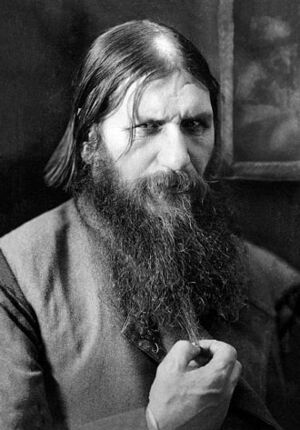Grigori Rasputin (nonfiction): Difference between revisions
(Created page with "thumb|Grigori Rasputin (1916).Grigori Yefimovich Rasputin (Russian: Григорий Ефимович Распутин; 21 January [O.S. 9 J...") |
No edit summary |
||
| Line 1: | Line 1: | ||
[[File:Grigori_Rasputin_1916.jpg|thumb|Grigori Rasputin (1916).]]Grigori Yefimovich Rasputin (Russian: Григорий Ефимович Распутин; 21 January [O.S. 9 January] 1869 – 30 December [O.S. 17 December] 1916 | [[File:Grigori_Rasputin_1916.jpg|thumb|Grigori Rasputin (1916).]]'''Grigori Yefimovich Rasputin''' (Russian: Григорий Ефимович Распутин; 21 January [O.S. 9 January] 1869 – 30 December [O.S. 17 December] 1916) was a Russian peasant, an experienced traveler, a mystical faith healer, and trusted friend of the family of Nicholas II, the last Tsar of the Russian Empire. | ||
He became an influential figure in Saint Petersburg, especially after August 1915, when Nicholas took command of the army fighting in World War I. Advising his wife Alexandra Feodorovna in countless spiritual and political issues Rasputin became an easy scapegoat for Russian nationalists, liberals and aristocrats. | He became an influential figure in Saint Petersburg, especially after August 1915, when Nicholas took command of the army fighting in World War I. Advising his wife Alexandra Feodorovna in countless spiritual and political issues Rasputin became an easy scapegoat for Russian nationalists, liberals and aristocrats. | ||
Revision as of 08:44, 27 December 2016
Grigori Yefimovich Rasputin (Russian: Григорий Ефимович Распутин; 21 January [O.S. 9 January] 1869 – 30 December [O.S. 17 December] 1916) was a Russian peasant, an experienced traveler, a mystical faith healer, and trusted friend of the family of Nicholas II, the last Tsar of the Russian Empire.
He became an influential figure in Saint Petersburg, especially after August 1915, when Nicholas took command of the army fighting in World War I. Advising his wife Alexandra Feodorovna in countless spiritual and political issues Rasputin became an easy scapegoat for Russian nationalists, liberals and aristocrats.
There is uncertainty over much of Rasputin's life and the degree of influence that he exerted over the weak-willed Tsar and the strong-willed Tsarina. Accounts are often based on dubious memoirs, hearsay, and legend.
While his influence and position may have been exaggerated — Rasputin became synonymous with power, debauchery and lust — his presence played a significant role in the increasing unpopularity of the Imperial couple.
Rasputin was murdered by monarchists who hoped to save Tsarism by ending his sway over the royal family.
In the News
Fiction cross-reference
Nonfiction cross-reference
External links:
- Grigori Rasputin @ Wikipedia
